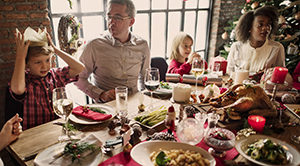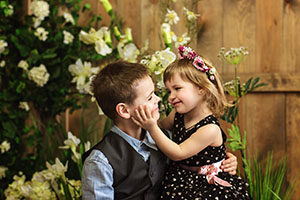The events that make holiday seasons special for kids – festive atmospheres, gifts, and visiting family – are also events that may spread illness and cause mishaps. Fortunately, a bit of foresight will prevent almost all problems.
 1. Vaccinate against influenza. Family gatherings bring together people of all ages, from different communities, crowd them into close contact, with much hugging and kissing, all ideal for spreading the flu. Young children are especially susceptible to severe cases. There are no known serious side effects from flu vaccines.
1. Vaccinate against influenza. Family gatherings bring together people of all ages, from different communities, crowd them into close contact, with much hugging and kissing, all ideal for spreading the flu. Young children are especially susceptible to severe cases. There are no known serious side effects from flu vaccines.
2. Give your friends and relatives the gift of declining their invitations when your children are ill. Kids with fevers and respiratory infections (runny noses and severe coughs) are likely contagious. Especially vulnerable to these illnesses are other children, the elderly, pregnant women, and individuals who are immune compromised.
 3. Mentally baby-proof homes you visit, especially ones where no children reside. Such hosts are less likely to be child-safety savvy. Look for areas free of lamps to pull down, curtain cords that reach the floor, away from doors and stairs, and out of reach of holiday ornaments. (One way to map out safe areas is for you to get down and crawl around for a “toddlers-eye” view.) Doors and windows are often left open for parties. Kitchens and bathrooms are especially hazardous. Mistletoe and holly berries cause intestinal upsets when ingested. Many tree ornaments are fragile, break easily, and the pieces can cause cuts if handled or mouthed.
3. Mentally baby-proof homes you visit, especially ones where no children reside. Such hosts are less likely to be child-safety savvy. Look for areas free of lamps to pull down, curtain cords that reach the floor, away from doors and stairs, and out of reach of holiday ornaments. (One way to map out safe areas is for you to get down and crawl around for a “toddlers-eye” view.) Doors and windows are often left open for parties. Kitchens and bathrooms are especially hazardous. Mistletoe and holly berries cause intestinal upsets when ingested. Many tree ornaments are fragile, break easily, and the pieces can cause cuts if handled or mouthed.
4. Deadly holiday-related mishaps are extremely rare, but occur. Check food if your child has significant food allergies. The incidence of house fires increases around holidays, caused by candles, defective wiring for decorations, and malfunctioning heaters to warm spare rooms. Ask about smoke and carbon monoxide detectors. Every year, several children are hospitalized for alcohol intoxication from drinking liquor left on coffee tables, and shot by other children who find poorly concealed guns.
 5. Appoint a designated “toddler watcher.” Everyone wants to play with infants and toddlers. But when “everyone” watches them, no one is in charge, and toddlers wander off. When not overseeing your child yourself, make sure that someone responsible is, and that they personally return the child to you.
5. Appoint a designated “toddler watcher.” Everyone wants to play with infants and toddlers. But when “everyone” watches them, no one is in charge, and toddlers wander off. When not overseeing your child yourself, make sure that someone responsible is, and that they personally return the child to you.
6. Be wary of pets. No dog is totally predictable, especially ones not accustomed to children. Two-thirds of dogs that bite have no history of aggressive behavior. Toddlers may innocently incite dogs by suddenly running towards them, arms flailing and making happy noises – behavior dogs may interpret as threatening. Pets are edgy during large gatherings: owners spend less time with them, the presence of many unfamiliar people, much activity and noise.
 7. Check toys. Well-meaning friends and relatives may bring presents that are age-inappropriate, have sharp edges or small pieces, or do not include protective items to go with the presents, helmets for skates and bikes, for example. Toys may have been brought from overseas and bypassed safety inspections. Toys requiring plugging into electric circuits are inappropriate for children younger than 10 years of age. Avoid toys which require small batteries – these can become detached and swallowed.
7. Check toys. Well-meaning friends and relatives may bring presents that are age-inappropriate, have sharp edges or small pieces, or do not include protective items to go with the presents, helmets for skates and bikes, for example. Toys may have been brought from overseas and bypassed safety inspections. Toys requiring plugging into electric circuits are inappropriate for children younger than 10 years of age. Avoid toys which require small batteries – these can become detached and swallowed.
8. Be wary of food left standing at room temperature for long periods. Hosts are often inexperienced at catering for large groups. Guests also bring food. Buffets are popular. With people coming and going, food is left standing out in hot rooms for long periods. Creamy items are especially likely to spoil.
 9. Ideally, have infants and toddlers sleep in their own crib. For overnight stays, portable travel cribs are handy. Avoid “heirloom” cribs. These may date back to before stringent regulations regarding paint and spacing between slats. Also, avoid “co-sleeping. Infants have been injured falling off beds, or by adults rolling onto them, (especially obese and sound sleeper adults). Infants may experience breathing difficulties by burying their heads into pillows, blankets and loose bed linen.
9. Ideally, have infants and toddlers sleep in their own crib. For overnight stays, portable travel cribs are handy. Avoid “heirloom” cribs. These may date back to before stringent regulations regarding paint and spacing between slats. Also, avoid “co-sleeping. Infants have been injured falling off beds, or by adults rolling onto them, (especially obese and sound sleeper adults). Infants may experience breathing difficulties by burying their heads into pillows, blankets and loose bed linen.
10. Children who take baths and showers alone at home may need assistance elsewhere.Many bathroom fixtures are difficult to decipher, even for adults. Bathroom doors should remain unlocked and should be no electrical equipment accessible. Children receive burns in showers by turning up the hot water and then falling, trying to escape the water. Most tub injuries occur exiting the tub. For example, grab bars may not be reachable by children. Instead, they reach for non-weight bearing towel racks, which pull off the wall. Floors wet from splashing increase the accident risk.

